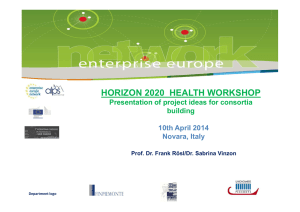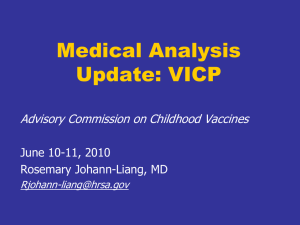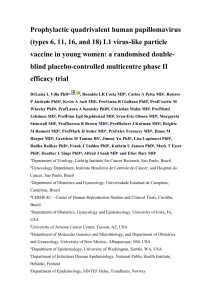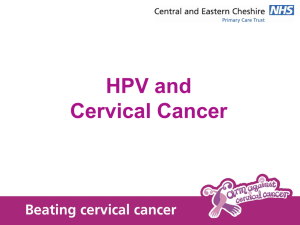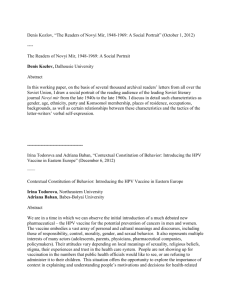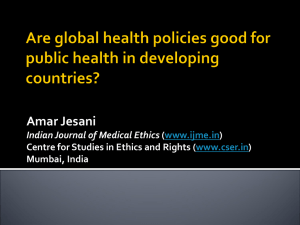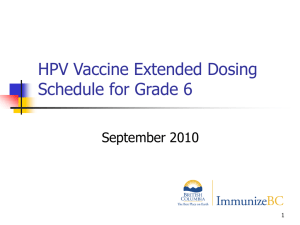Report - New Maps - University of Kentucky
advertisement
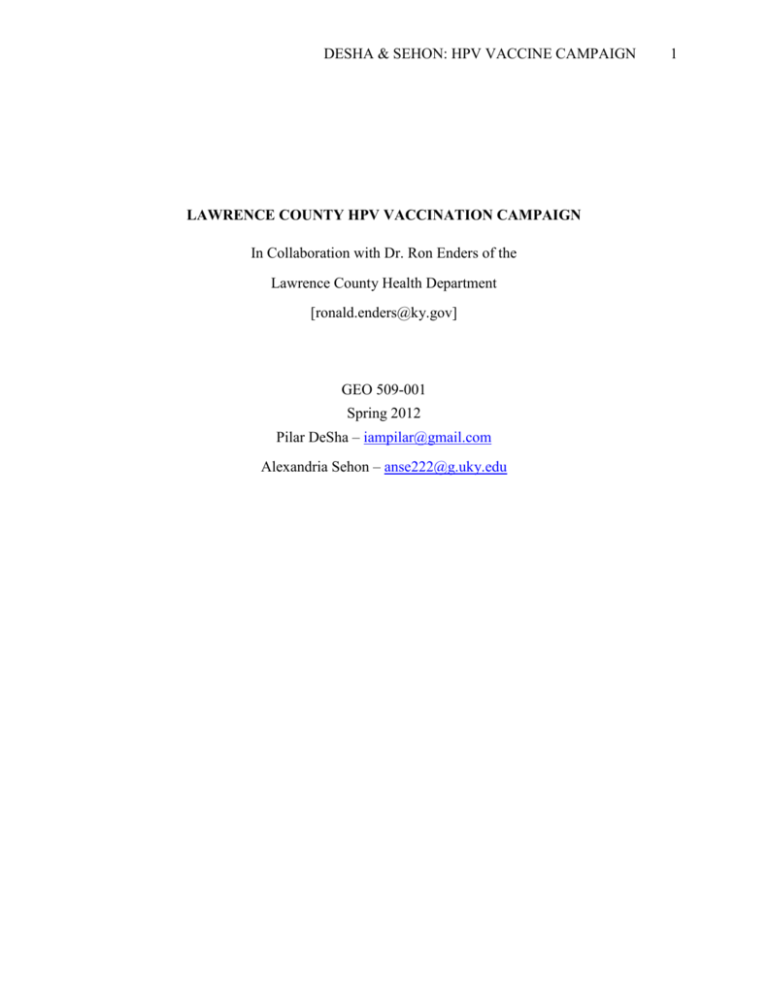
DESHA & SEHON: HPV VACCINE CAMPAIGN LAWRENCE COUNTY HPV VACCINATION CAMPAIGN In Collaboration with Dr. Ron Enders of the Lawrence County Health Department [ronald.enders@ky.gov] GEO 509-001 Spring 2012 Pilar DeSha – iampilar@gmail.com Alexandria Sehon – anse222@g.uky.edu 1 DESHA & SEHON: HPV VACCINE CAMPAIGN TABLE OF CONTENTS 2 DESHA & SEHON: HPV VACCINE CAMPAIGN 3 PROJECT SUMMARY In conjunction with the Lawrence County Health Department, UK students examined the spatial relationships between HPV vaccinations in Lawrence County and several factors including income, education, and topography. With a grant from CancerFreeKY the Lawrence County Health Department launched an educational HPV vaccine campaign in 2011 to mitigate the HPV infection rate in Eastern Kentucky. The campaign offers a three-shot series to county residents between the ages of 9 and 26. In order to provide analysis and success rates of the campaign, UK students mapped patient-provided home addresses to examine their proximity to social, economic, and physical inhibitors. The goals of the project were to render data driven maps, which in turn could be used as visualizations for future grant proposals. ESRI ArcMap technology and geographic information attained from the US Census Bureau at census tract and block levels were used to create visualizations. Maps displayed areas with high and low rates of vaccination that overlaid information on population density, social provisions (areas with high/low rates of telephone service), and other key demographic elements. These outputs help prioritize the health department’s decision making in future HPV vaccination campaigns by identifying and mapping areas of concern in the community. By integrating census data with other map data sets the project was able to distinguish areas of Lawrence County that had significantly different distribution rates of education, gender, and social amenities. DESHA & SEHON: HPV VACCINE CAMPAIGN NEEDS ASSESSMENT REPORT: February 10th, 2012 4 DESHA & SEHON: HPV VACCINE CAMPAIGN Project Background Information This project functions as a resource for the Lawrence County KY Health Department. In the hopes of mitigating this problem, the LC Health Department in 2011 developed an educational outreach campaign aimed at middle and high school students, which provides free HPV vaccinations for women and men 11-26 years of age; The HPV vaccination is administered by public school nurses and the local health department. The vaccination campaign is made possible by a KY wide grand from CanerFreeKY. Surrounding counties have similar campaigns with little to no documentation of success rates. The University of Kentucky has partnered with the Health department to develop a series of ArcGIS maps. These maps will identify previous vaccination recipients in Lawrence County and help to explore the social, economic, and physical inhibitors for the population targeted to receive the HPV vaccination. This mapping project will provide essential data to other state departments of public health, expanding the strategies & resources available for the development of future HPV campaigns. Goals and Objectives of Project Objective: We will identify regions of Lawrence County underrepresented by the current vaccine recipient distribution based upon patient-provided address data and begin to identity potential factors preventing eligible residents from receiving the vaccine. This data will be used in a presentation arguing for the continuance of funding for the Lawrence County HPV Vaccination Campaign. Goals: 1. Show by census tract districts of Lawrence County, which have the highest rate of completion of all three vaccine doses during the campaign and look for geographic patterns in the number of individuals who begin the regiment but do not complete it. 2. Compare the rate of vaccination in Lawrence County in the past 3 months with that of 5 DESHA & SEHON: HPV VACCINE CAMPAIGN 6 neighboring counties that do not have similar HPV vaccine campaigns. 3. Use US Census Bureau data as well as community profile data available for Lawrence County to begin positing geographic, demographic, and cultural barriers to eligible residents not receiving the vaccine. Data Acquisition and Preparation Steps Steps required for completion of goals: Goal 1:Data regarding vaccination recipients in the Lawrence County HPV campaign is collected through school nurses and given to Ron Enders at the LC Health Department. This data is then received by the University of Kentucky in an excel document containing street addresses, latitude, longitude and city location. This data will need to be geocoded in order to prepare for mapping and analysis. Goal 2: Data regarding HPV vaccinations from surrounding counties will be acquired through shared data from their Health Departments and through CancerFreeKY, an organization that funds HPV vaccination campaigns. Goal 3. US Census Bureau data will be downloaded from: Data will be based on education, income, age, and access to social amenities, such as telephone service. http://www.census.gov/cgi-bin/geo/shapefiles2010/main & http://factfinder2.census.gov Maps and Other Analytical Products In order for the numerical data regarding patient outreach as well as hypotheses regarding barriers to the vaccine, a series of GIS maps (4-7) will be created in ESRI’s ArcMap software and prepared for DESHA & SEHON: HPV VACCINE CAMPAIGN 7 presentation. These maps should symbolize: 1. How many residents of Lawrence County received the 1st, 2nd, and 3rd vaccine doses and the generalized location of their home addresses. 2. Comparison of the rate of HPV vaccination for counties surrounding Lawrence County over a similar time period. 3. Which regions within Lawrence County had the highest number of vaccinations and which regions had lower rates of participation. 4. Geographic distribution of potential barriers to the vaccine. Terrain- digital Elevation model data, resident demographics (age, income, etc.), and infrastructure will be considered as sources of possible difficulty. Further, a digital portfolio will be prepared for the Lawrence County Health Department Vaccine Campaign coordinators and will contain relevant layer files, shape files and original map (.mxd) and Excel files. The digital portfolio will be useful in the future as more patient data is added to understand the long-term participation patterns of the vaccination campaign as well as a comparison tool for other counties or future projects. Steps Required Name Deadline Task 1 Alli 2/13/2012 Geocode patient address provided by Ron. 2 Pilar 2/14/2012 Contact CancerFreeKY for county comparison data and/or more on Lawrence Co. 3 Pilar 2/16/2012 Download and process (shape files) Census Bureau data. 4 Alli 2/16/2012 Contact Ron and begin creating base map of LC regions. 5 Alli & Pilar 2/16/2012 Begin clipping and merging data and base maps for the LC and surrounding counties. 6 Pilar 3/1/2012 Symbolizing a terrain map for LC DESHA & SEHON: HPV VACCINE CAMPAIGN 7 Alli 3/1/2012 Symbolize a local/county roads map for LC and surrounding counties. 8 Pilar 3/1/2012 Symbolize a map of local schools and health department. 9 Alli 3/3/2012 Overlaying patient data to created base maps. 10 Alli & Pilar 3/8/2012 Symbolize data for 3 stage vaccine process (heat map?) 11 Alli & Pilar 3/22/2012 Progress Report Due 12 Alli & Pilar 3/27/2012 Symbolize a map for available surrounding counties vaccination. 13 Alli 3/29/2012 Start on map for road wash-outs during past 3 months in LC. Update and geocode patient address database 14 Alli & Pilar 4/17/2012 Review and Edit previous maps and consider creative options. 15 Alli & Pilar 4/19/2012 Compose digital portfolio of relevant files. 8 DESHA & SEHON: HPV VACCINE CAMPAIGN PROGRESS REPORT: March 22nd, 2012 9 DESHA & SEHON: HPV VACCINE CAMPAIGN 10 Completed Tasks 1. Collected and edited first half of patient addresses from Dr. Enders. Addresses were converted to decimal degree format and saved in an Excel document readable by ArcMap. a. Patient_Addresses_v1.xls 2. Downloaded demographic data (educational attainment and income) from US Census Bureau. Edited and formatted Excel documents to be readable by ArcMap. a. Education_LC_CensusTract_v2.xls b. Incomeexcelxlsx.xlsx 3. Downloaded a shape file containing polygon data for all Kentucky counties. The data was clipped into two separate base maps: one displaying Lawrence County boundaries and a second map showing boundaries for Lawrence County and all surrounding Kentucky counties. a. LawrenceCo_Base.mxd b. SurroundingCo.shp 4. A local-road shape file was created by clipping road data for the state of Kentucky to the boundaries of the Lawrence County base map above. a. LC_roads.shp 5. A shape file showing the location of patient addresses was created by converting the Patient_Addresses_v1 Excel file to XY coordinates in ArcMap and exporting the resulting event layer as a shape file. a. Visit1_Add_XY3.shp DESHA & SEHON: HPV VACCINE CAMPAIGN 11 6. A shape file of prominent regions/cities in Lawrence County was created by clipping data for the state of Kentucky to the Lawrence Co boundaries. a. LC_Cities.shp 7. Map of Educational Attainment at the level of the census tract was created using above data and symbolized as a choropleth map with patient address data overlaid. a. LawrenceCo_HPV_Education.mxd 8. Map of Median Income at the census tract level was created using above data and symbolzed as a choropleth map with patient address data overlaid. a. LawrenceCo_HPV_Income.mxd Problems and Questions Part of the original objective is to identify physical barriers in Lawrence Co. preventing eligible residents from receiving the vaccine. There is still a need to accumulate meaningful terrain data that will enable us to produce a topographical map for this purpose. Goal two of the needs assessment report has not been met: Comparing the rate of vaccination in Lawrence Co. in the past 3 months with that of neighboring counties that do not have similar HPV vaccine campaigns. Originally it was thought CancerFreeKY would have a centralized database on vaccines distributed by KY health departments, this has not been the case due to lack of transparency. A possible solution to this would be to individually contact surrounding county health departments to request any available data. Further clarification is needed from Dr. Enders concerning our final deliverables. Should a map portfolio be prioritized? Or would there be any need to create a PowerPoint schematic outlining the significance of each product? DESHA & SEHON: HPV VACCINE CAMPAIGN 12 Initially we had difficulties with matching the provided patient street addresses with geographical coordinates. The first attempt to geocode resulted in a 25% match rate. A solution was found by using Google maps to convert addresses to decimal degree format (for latitude and longitude). This method resulted in a 95% match rate of all addresses. Leading into a question concerning possible HIPPA violations—Our first two maps identify streets in Lawrence Co., this is useful for map clarity but does it violate HIPPA law? How should we present patient address data without exposing patients to identification by the public or other individuals? Should this even be a concern? Summary of Mid-Project Meeting Our last meeting with Dr. Ron Enders helped to focus our project on the most appropriate products to deliver at the end of the semester. Dr. Enders identified the areas he believes will yield the most interesting results: education, income, distance from vaccine-equipped locations, and availability of cable Internet for Lawrence County residents. We agreed that the most useful format for the data would be in polished, finished maps (JPEG and MXD files) and associated shape files, layer data, and excel files. The maps will be used in presentations and reports submitted to the grant review committee and the digital data will be reserved for Dr. Enders’ reference and future use. Further, we set a deadline of April 10th for Dr. Enders to send data to us to be included in the project. The deadline is designed to give Pilar and me enough time to process and incorporate the data into a professional looking map without haste. We will also abide by the deadline and collect no more data from the Census Bureau or other sources (unless difficult circumstances arise) after April 10th. After going over the maps of Educational DESHA & SEHON: HPV VACCINE CAMPAIGN 13 Attainment and Median Income we submitted to Dr. Enders (Appendix B), he approved of the format and data richness of each map, giving us visual templates and foundations for the rest of our project. Explanations of Changes to Project Goals Since the beginning of the semester, we have refocused the project due to data availability and the refinement of mutual goals. For example, the data deadline is a new addition, as well as the decision to only create publishable maps for the grant renewable proposal. We’ve also narrowed our “demographic” mapping element to three key areas: education, income, and accessibility of cable Internet in Lawrence County. The group has decided these themes are relevant to the receipt of HPV vaccines and can be observed through available datasets (online and through the Lawrence County Health Department). Other maps will be created as well, comparing number of patient visits in various regions of Lawrence County as well as road quality, but demographic data will be limited to the above areas and will only be presented at the level of the census tract. We have also added the possibility of creating a ‘flow map’ to visualize the relative distance between patient addresses and vaccine-equipped locations, and the frequency of travel on those paths. This map may help distinguish ‘silent’ areas of Lawrence County that not only have no patient residents, but no or little road access. DESHA & SEHON: HPV VACCINE CAMPAIGN DATA DICTIONARY: May 1st, 2012 14 DESHA & SEHON: HPV VACCINE CAMPAIGN 15 1. Name: LC_Patient_Round1.xls a. Source: Ron Enders, 2-2-12 b. Includes addresses for all patients receiving at least one HPV vaccine shot from the Lawrence County department of health during the initial trial period. c. Steps: i. Input addresses into Google Maps (one at a time) ii. Convert to decimal degree format (for lat and long) iii. Insert decimal degree address in excel file iv. Upload excel file to ArcMap v. Convert to XY coordinates geo-locator vi. Create an event file that places each address on a base map of Lawrence Co. vii. Export the event file as a shape file LC_Patient_Round1.shp 2. Name: LC_Patient_Round2.xls a. Source: Ron Enders, 2-2-12 b. Includes addresses for all patients receiving at least one HPV vaccine shot from the Lawrence County department of health during the second phase of the trial period. c. Steps: i. Input addresses into Google Maps (one at a time) ii. Convert to decimal degree format (for lat and long) iii. Insert decimal degree address in excel file iv. Upload excel file to ArcMap v. Convert to XY coordinates geo-locator vi. Create an event file that places each address on a base map of Lawrence Co. vii. Export the event file as a shape file LC_Patient_Round2.shp 3. Name: Vaccine_Locations.xls a. Source: Alli Sehon (via. Google Maps), 3-2-12 b. Includes addresses for schools and health department facilities administering the vaccine in Lawrence Co. DESHA & SEHON: HPV VACCINE CAMPAIGN 16 c. Steps: i. Input addresses into Google Maps (one at a time) ii. Convert to decimal degree format (for lat and long) iii. Insert decimal degree address in excel file iv. Upload excel file to ArcMap v. Convert to XY coordinates geo-locator vi. Create an event file that places each address on a base map of Lawrence Co. vii. Export the event file as a shape file Vaccine_Locations_XY_v1.shp 4. Name: Education_LC_CensusTract_v2.xls a. Source: US Census Bureau 5-year ACS estimates, 3-3-12 b. Includes educational attainment for residents of Lawrence County broken into total population, male, female, and age brackets and showing percentages (of the total population) of high school, associates, and bachelors degrees attained. c. Steps: i. Upload excel file to ArcMap base map of Lawrence Co Census Tracts (LawrenceCo.shp). ii. Join the attribute table for both files based on key CensusTract. iii. Symbolize education data as a choropleth map overlain with patient address data from both phases of the campaign (LawrenceCo_Education_Round1.mxd and LawrenceCo_Education_Round2.mxd). 5. Name: Incomeexcelxlsx.xlsx a. Source: US Census bureau 5-year ACS estimates, 3-4-12 b. Includes median income data estimates for each of the 5 Lawrence Co census tracts. c. Steps: i. Upload excel file to ArcMap base map of Lawrence Co Census Tracts (LawrenceCo.shp). ii. Join the attribute table for both files based on key CensusTractName. iii. Symbolize education data as a choropleth map (Income.mxd). DESHA & SEHON: HPV VACCINE CAMPAIGN 17 6. Name: LC_Telephone_Zip.xls a. Source: US Census Bureau 2010, 4-10-12 b. Contains data on the presence of telephone service in homes in Lawrence County. Data is divided by whether the resident is a home-owner or a home-renter and is presented at the scale of the zip code. c. Steps: i. Upload excel file to ArcMap base map of Lawrence County (LawrenceCo.shp). ii. Join the attribute table for both files based on the keys “ZCTA5CE00” and “Zip Code.” iii. Symbolize telephone data as four choropleth maps overlain with patient address data (LawrenceCo_HPV_TelephoneService_OwnersRound1.mxd; LawrenceCo_HPV_TelephoneService_OwnersRound2.mxd; LawrenceCo_HPV_TelephoneService_RentersRound1.mxd; LawrenceCo_HPV_TelephoneService_RentersRound2.mxd). 7. Name: LawrenceCo_Demographics_v2.xlsx a. Source: US Census Bureau 2010, 4-17-12. b. Contains data on rates of age groups by census tract in Lawrence County. c. Steps: i. Upload excel file to ArcMap base map of Lawrence Co Census Tracts (LawrenceCo.shp). ii. Join the attribute table for both files based on key Census Tract. iii. Symbolize age data as four choropleth maps overlain with patient address data from both phases of the campaign (LawrenceCo_HPV_FemPop_Round1.mxd; LawrenceCo_HPV_FemPop_Round2.mxd; LawrenceCo_HPV_MalePop_Round1.mxd; LawrenceCo_HPV_MalePop_Round2.mxd). 8. Name: 10dem a. Source: http://kymartian.ky.gov/ b. Contains digital elevation models of Lawrence County. DESHA & SEHON: HPV VACCINE CAMPAIGN 18 c. Steps: I. II. Upload Dem data to ArcMap View-Toolbars and turn on the Spatial Analyst toolbar III. Check Hillshade IV. Symbolize shaded relief and overlay with patient address data from both (LawrenceCo_Topography_Round1) (LawrenceCo_Topography_Round2) DESHA & SEHON: HPV VACCINE CAMPAIGN FINAL OUTPUTS: MAPS May 1st, 2012 19 DESHA & SEHON: HPV VACCINE CAMPAIGN Map 1a. 20 DESHA & SEHON: HPV VACCINE CAMPAIGN Map 1b. 21 DESHA & SEHON: HPV VACCINE CAMPAIGN Map 1c. 22 DESHA & SEHON: HPV VACCINE CAMPAIGN Map 2a. 23 DESHA & SEHON: HPV VACCINE CAMPAIGN Map 2b. 24 DESHA & SEHON: HPV VACCINE CAMPAIGN Map 3a. 25 DESHA & SEHON: HPV VACCINE CAMPAIGN Map 3b. 26 DESHA & SEHON: HPV VACCINE CAMPAIGN Map 4a. 27 DESHA & SEHON: HPV VACCINE CAMPAIGN Map 4b. 28 DESHA & SEHON: HPV VACCINE CAMPAIGN Map 4c. 29 DESHA & SEHON: HPV VACCINE CAMPAIGN Map 4d. 30 DESHA & SEHON: HPV VACCINE CAMPAIGN Map 5a. 31 DESHA & SEHON: HPV VACCINE CAMPAIGN Map 5b. 32 DESHA & SEHON: HPV VACCINE CAMPAIGN Map 6a. 33 DESHA & SEHON: HPV VACCINE CAMPAIGN Map 6b. 34 DESHA & SEHON: HPV VACCINE CAMPAIGN Map 7a. 35 DESHA & SEHON: HPV VACCINE CAMPAIGN Map 7b. 36 DESHA & SEHON: HPV VACCINE CAMPAIGN Map 7c. 37 DESHA & SEHON: HPV VACCINE CAMPAIGN Map 7d. 38 DESHA & SEHON: HPV VACCINE CAMPAIGN 39 CONCLUSION In Lawrence County, there is a distinct pattern of vaccine recipients based upon several key factors. Louisa, the largest residential area in Lawrence County, has the highest rate of vaccine recipients for both the first and second campaigns. To an extent, this is likely due to the higher population density in the city compared to outlying areas, such as Blaine and Martha townships. However, Louisa also has the most institutions equipped to administer the vaccine, three schools and the health department. Considering the relatively rough, mountainous terrain in outlying areas of Lawrence County, living near vaccine administration centers may encourage individuals to not only initiated vaccination but to complete the 3-shot series over a period of several months. Further, it seems that the first campaign was more successful in reaching Louisa residents, while the second campaign had greater success in reaching rural and out-of-county residents, according to patience provided data. Three key demographic factors were highlighted in maps over the course of the project: median income, median age, and educational attainment of residents. Demographic information was obtained from the US Census Bureau 10-year census as well as the 5-year ACS estimates and was focused at the level of the five census tracts in Lawrence County. Choropleth maps were created which symbolized the distribution of income, age, and education across the county and were overlain with points depicting patient provided addresses. Relationships between the demographic markers and patient residence can then by hypothesized in order to better understand existing barriers preventing segments of the Lawrence County population from receiving the HPV vaccine series. The small sample size (between 30-50 residence points for each campaign) makes finalizing conclusions problematic, however it is possible to see trends emerge. For example, DESHA & SEHON: HPV VACCINE CAMPAIGN 40 while educational attainment as observed by rate of high school graduation does not seem to have a direct impact on who seeks out the vaccine, areas with higher median income do appear to be home to a higher number of vaccine recipients. There does not seem to be a pattern either when considering total population of residents ages 10 to 25 of both sexes in relation to the residence of patients; the areas with both the highest and lowest percentages of potential vaccine recipients are seemingly underserved. However, the high population density and more even age dispersal in Louisa means then that the lack of pattern elsewhere is not surprising. Along with the location of facilities that offer the HPV vaccine for free, the topography of Lawrence County seems to be one of the most significant factors. According to both topographic maps, all patients who reported addresses to the health department live along major county roads or in the Louisa city limits. Several addresses were eliminated from data processing because they could not be located on a map, and these may well represent the noncounty road residents, yet even so a vast majority of the patients reside on larger thoroughfares. Considering the apparent difficulty of intra-county transportation, the importance of maintaining multiple vaccine locations outside of the Louisa city limits is very clear.

